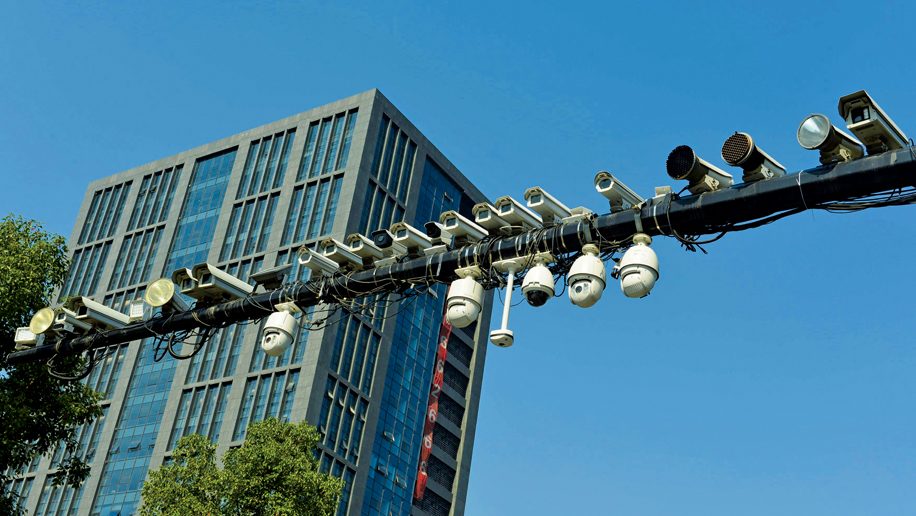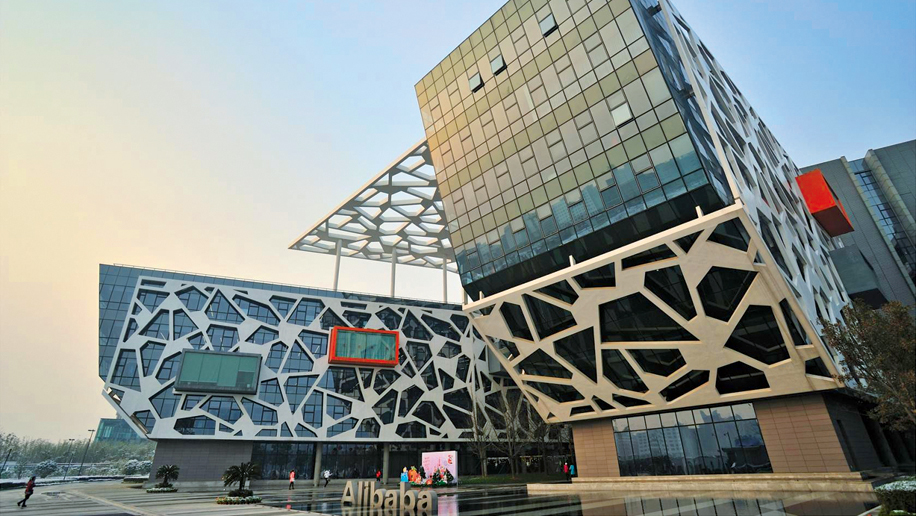
Lining the walls of a large, white, circular room are dozens of CCTV cameras, their all-seeing lenses trained on the crowd below. As people walk about, portraits start to appear on mounted TV monitors, along with personal statistics such as height and gender. I see my own face pop into view, along with an estimation of my age, which, to my dismay, is off by about ten years – and not in the flattering direction.
Being displayed on another screen is a veritable army of small orange robots zipping across a post office warehouse. The fully automated bots are using HD cameras and QR codes placed on the floor to move about and sort packages into their correct locations. “When they run out of electricity, they calculate the route they have to take to get to the charging stations and then charge themselves,” my guide explains.
In the middle of the room, sitting atop a white plinth, is a large remote-controlled drone about a metre wide. Next to it is a rifle with what can only be described as a television aerial sticking out from the barrel. According to my guide (who I’m tempted to call “Q” at this point), the aerial gun blocks a drone’s remote radio signal – using jamming equipment used in China’s space technology – thus causing it to fall from the sky.
This is the headquarters of Hikvision, a multinational technology company that has its head office in Hangzhou, the capital of eastern China’s Zhejiang province southwest of Shanghai. While its name may not be as familiar as other tech behemoths like Alibaba or Huawei, the 16-year-old Chinese company is a giant in its own right, with a market capitalisation of more than US$20 billion and a 19.5 per cent market share of the global video surveillance industry. The company has more than 20,000 employees worldwide, with its products being utilised all over the world from the Brazil World Cup Stadium to Milan’s Malpensa Airport.

Hikvision’s technological prowess is not an unusual story in Hangzhou: Net Ease, an internet technology company located in the city’s Binjiang district, was founded in 1997 and helped spearhead the development of internet services in China. Zhejiang Dahua Technology – another video surveillance company – is also headquartered in Binjiang. Meanwhile, telecommunications giant Huawei – headquartered in Shenzhen – has a large research centre in Hangzhou. In fact, the proliferation of powerful tech companies has given rise to the moniker “China’s Silicon Valley”. That’s a title also used in association with Shenzhen and a few other Chinese cities – yet none of China’s home-grown tech companies is as internationally renowned as Alibaba.
Famously founded in Jack Ma’s one-bedroom Hangzhou apartment in 1999, the company is now in a head-to-head with Amazon to achieve a US$500 billion valuation. Spreading out over 150,000 sqm in the city’s Yuhang district, its greenery-laden corporate campus boasts an iconic spider-web exterior. Inside it’s a hive of innovation, home to more than 9,000 employees and a beacon for the spirit of entrepreneurialism that has rippled throughout the city.
Alibaba’s presence in Hangzhou extends far beyond its headquarters. Each October, the company hosts The Computing Conference, which attracts tens of thousands of attendees from across the globe. At this year’s event, Ma announced a US$15 billion investment in the company’s new Alibaba DAMO Academy, an initiative aimed at tackling research in areas such as data intelligence, Internet of Things (IoT), financial technology (fintech), quantum computing and human-machine interaction. As part of the effort, the company will open seven research labs across the globe: as well as Hangzhou, they’ll be located in Beijing, Singapore, Moscow, Tel Aviv, and San Mateo and Bellevue in the US.
Earlier this year, the company also unveiled a more “offline” development. Despite making its name as an e-retailer, July saw the launch of Alibaba’s “Tao Café”, an unmanned shop concept that sees tills and cash replaced by smartphone payments. By scanning a QR code on the Taobao app at the entrance of the store, patrons are tracked with cameras for facial recognition. Customers can then automatically make a purchase through their smartphones without needing to head to a register, and be able to leave the store with their items in hand.

Leveraging momentum
Keen to capitalise on the presence and start-up spirit of these tech giants, the city’s government has begun to actively promote Hangzhou as a key technological hub. According to the Hangzhou Tourism Commission (HTC), “Hangzhou has introduced a series of policies to attract high-tech enterprises to settle in Hangzhou. Among these, the ‘Hangzhou Silicon Valley incubator’ has contributed 21 outstanding high-tech enterprises that have settled here.”
This incubator project comes in two forms: a US$50 million cross-border venture-capital guidance fund aimed at exploring the establishment of overseas equity investment enterprises; and the implementation of overseas venture-capital enterprises and seeking out angel investors to invest in the pilot work of Hangzhou-based, non-listed enterprises.
But the city’s promotion of its tech-hub credentials isn’t limited to direct funding of such initiatives. “Hangzhou has spawned a large number of well-known internet companies, but the superior entrepreneurial environment has also encouraged a proliferation of financial enterprises, cultural and creative enterprises,” said an HTC spokesperson.

In particular, the events industry is seen as a major player in the city’s ongoing economic development. “The MICE [meetings, incentives, conferences and exhibitions] industry is seen as an important breakthrough in the transformation and development of Hangzhou’s tourism industry, the promotion of urban internationalisation, and the creation of a high-end international conference destination,” stated the HTC. “Development of the MICE industry will promote the regional economy and will also serve as a potential attraction for high-tech enterprises.”
The city certainly aims high in its hosting of major international events: in September 2016, Hangzhou hosted the G20 summit, attended by world leaders from China, the US, Russia, Germany, France, the UK, Japan, South Korea and India, among others. This was the summit that saw the ratification of the Paris Agreement by then-US President Barack Obama and Chinese President Xi Jinping (the same agreement from which current US President Donald Trump controversially announced the US would withdraw). As well as being the first G20 Summit to be held in China, it was also one of the few in the conference’s history held in a secondary city.
Visitors to Hangzhou can view the very halls where key meetings were held – the Hangzhou International Expo Center has kept key rooms from the G20 Summit set up as exhibits. The Expo Center is also home to one of Alibaba’s aforementioned unmanned convenience stores, located outside the main entrance. Further down the line in 2022, Hangzhou is also set to play host to the Asian Games.

With major developments in business, MICE and tourism, it comes as no surprise that air connectivity to the city has also been increasing. Xiamen Airlines will start flying between Hangzhou and Melbourne as of this month, while Beijing-based Capital Airlines’ one-stop service to Lisbon via Beijing took off in July – the Beijing-Lisbon leg being the first non-stop connection between China and Portugal. Last year American carrier United Airlines also launched a San Francisco-Hangzhou service, though this was stopped in October after being deemed “no longer economically viable”.
The Hangzhou Tourism Commission states that more than 200 domestic and international routes now connect the city with the rest of the world, adding that “the opening of these intercontinental routes has allowed Hangzhou to take a big step towards becoming an international city”.
Then again, if the rate of technological advancement continues, it might not be too long before visitors can be airlifted by drone, or simply beamed to their desired location via an app…












